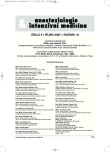Fast-track and ultra fast-track cardiac anaesthesia – postoperative pain and other parameters observation
Fast-track a ultra fast-track kardioanestezie – sledování bolesti a dalších parametrů v pooperačním období
Cíl studie:
Fast-track (opiátová složka alfentanil) a ultra-fast-track (opiátová složka remifentanil) – metody vedení celkové anestezie – se na našem pracovišti standardně užívají od roku 2001. Cílem práce je porovnat výsledky obou metod.
Typ studie:
Prospektivní observační studie.
Název a sídlo pracoviště:
Kardiochirurgická klinika FN Královské Vinohrady a 3. LF UK, Praha.
Materiál a metody:
V prospektivní studii bylo v průběhu roku 2006 sledováno 71 pacientů (alfentanil 32, remifentanil 39) podstupujících všechny typy standardních kardiochirurgických operací. Sledovány byly tyto parametry: čas do extubace, délka pobytu na jednotce pooperační a resuscitační péče, celková délka pobytu na kardiochirurgické klinice, výskyt pooperační fibrilace síní, hodnoty krevních plynů a hodnocení pooperační bolesti (měřena 1 hodinu po extubaci, 1. pooperační den pomocí vizuální analogové stupnice bolesti a zkrácené formy McGillského dotazníku bolesti) a počet analgetických dávek.
Výsledky:
Mezi skupinami jsme ve většině sledovaných parametrů neshledali statisticky významné rozdíly. Vnímání pooperační bolesti bylo závislé pouze na věku (p < 0,001) a na pohlaví pacienta (p = 0,042).
Závěr:
Obě metody umožnily časnou a bezpečnou pooperační extubaci kardiochirurgických nemocných.
Klíčová slova:
kardioanestezie – fast-track – remifentanil – alfentanil – bolest
Authors:
J. Šnircová 1; R. Fajt 1; J. Hrabák 1; M. Jareš 1; M. Kopa 2; T. Vaněk 1
Authors‘ workplace:
Kardiochirurgická klinika 3. LF UK a FNKV, Praha
1; Katedra pravděpodobnosti a matematické statistiky MFF UK, Praha
2
Published in:
Anest. intenziv. Med., 18, 2007, č. 5, s. 276-281
Category:
Anaesthesiology - Original Paper
Overview
Objective:
We have been using fast-track techniques (alfentanil and remifentanil based) for cardiac anaesthesia in our department routinely since 2001. The aim of this study was to compare these two methods.
Design:
A prospective follow-up study.
Setting:
Department of Cardiac Surgery, University Hospital Kralovske Vinohrady, Charles University, Prague.
Materials and methods:
In the prospective follow-up study, 71 consecutive patients (alfentanil 32, remifentanil 39) undergoing common cardiothoracic procedures were observed during 2006. The following parameters were observed: time to extubation, length of ICU stay, length of stay on ward, incidence of postoperative atrial fibrillation, blood gases, postoperative pain grade (assessed 1 hour after extubation and on 1st post - operative day on the visual analogue pain scale and the SF McGill questionnaire), analgesic requirements.
Results:
There were no statistically significant differences in the most of observed parameters. Postoperative pain was dependent solely on patient’s age (p < 0.001) and gender (p = 0.042).
Conclusion:
Both methods allow early and safe extubation of patients undergoing cardiothoracic surgery.
Key words:
cardiac anaesthesia – fast-track – alfentanil – remifentanil – pain
Labels
Anaesthesiology, Resuscitation and Inten Intensive Care MedicineArticle was published in
Anaesthesiology and Intensive Care Medicine

2007 Issue 5
-
All articles in this issue
- Cardiogenic shock and its current management options
- Professor Peter J. Safar, MD (1924–2003): unbelievable life career
- Fast-track and ultra fast-track cardiac anaesthesia – postoperative pain and other parameters observation
- Fibrinolysis and its management in cardiac surgery
- Perioperative beta-blockade
- Do beta-blockers still have their role in myocardial protection?
- Anaesthesiology and Intensive Care Medicine
- Journal archive
- Current issue
- About the journal
Most read in this issue
- Cardiogenic shock and its current management options
- Professor Peter J. Safar, MD (1924–2003): unbelievable life career
- Fibrinolysis and its management in cardiac surgery
- Fast-track and ultra fast-track cardiac anaesthesia – postoperative pain and other parameters observation
